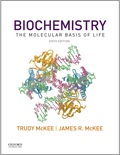
Concept explainers
To review:
The class of each of the given sugars.
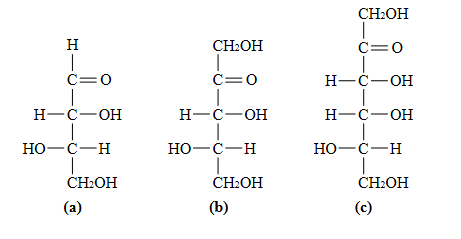
Introduction:
Carbohydrates are the most abundant
Explanation of Solution
The simplest carbohydrate, monosaccharide can either be aldoses or ketoses based on its functional group. When the functional group is an aldehyde, it is called an aldose. It is a ketose when the functional group is a ketone. The class, to which the given molecules belong, is described below:
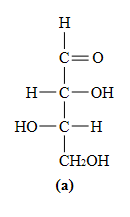
The above figure (a) is the structure of the monosaccharide
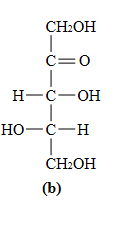
The figure number (b) shows the structure of
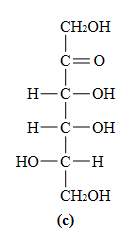
The above diagram (c) depicts the structure of
Thus, it can be concluded that the figure (a)depicts
Want to see more full solutions like this?
Chapter 7 Solutions
EBK BIOCHEMISTRY: THE MOLECULAR BASIS O
- What is the structural difference between an aldose and a ketose?arrow_forwardHow many chiral carbon atoms are in glucose in the cyclic form?arrow_forwardTrehalose, a disaccharide found in the blood of insects, has the following structure. What simple sugars would you obtain on hydrolysis of trehalose?arrow_forward
- Why is the parent chain pentane?arrow_forwarddraw the following amino acid chains and give the single and three letter abbreviations for cysteinearrow_forwardClassify each of the following sugar pairs as enantiomers, diastereomers, epimers, or an aldose–ketose pair. a. D-erythrose and D-threose b. D-glucose and D-mannose c. D-ribose and L-ribose d. D-allose and D-galactose e. D-glyceraldehyde and dihydroxyacetonearrow_forward
- Identify the component monosaccharides of each of the following compounds and describe the type of glycosidic linkage in each.arrow_forwardThe ring structure of the carbohydrate glucose is provided below. Map any chiral centers with a 1.arrow_forwardWhich of the following is false about cellulose?arrow_forward
 Biology Today and Tomorrow without Physiology (Mi...BiologyISBN:9781305117396Author:Cecie Starr, Christine Evers, Lisa StarrPublisher:Cengage Learning
Biology Today and Tomorrow without Physiology (Mi...BiologyISBN:9781305117396Author:Cecie Starr, Christine Evers, Lisa StarrPublisher:Cengage Learning
